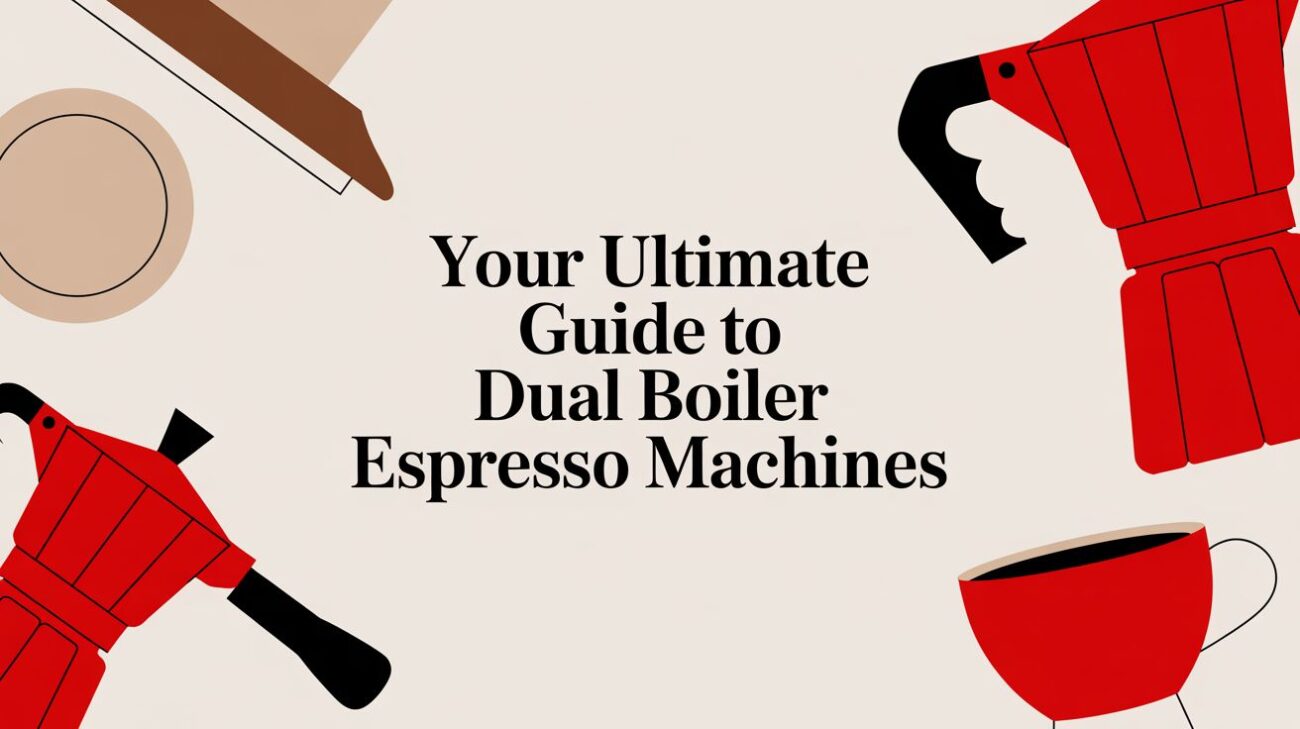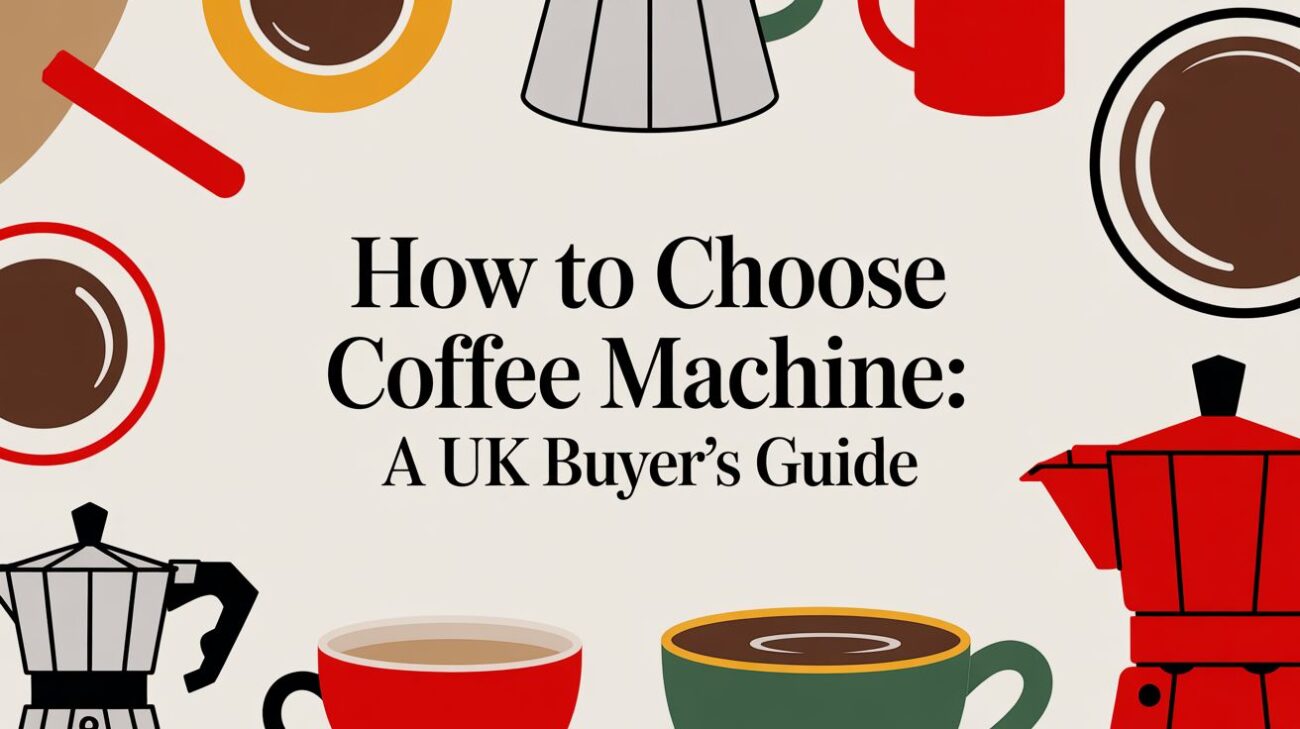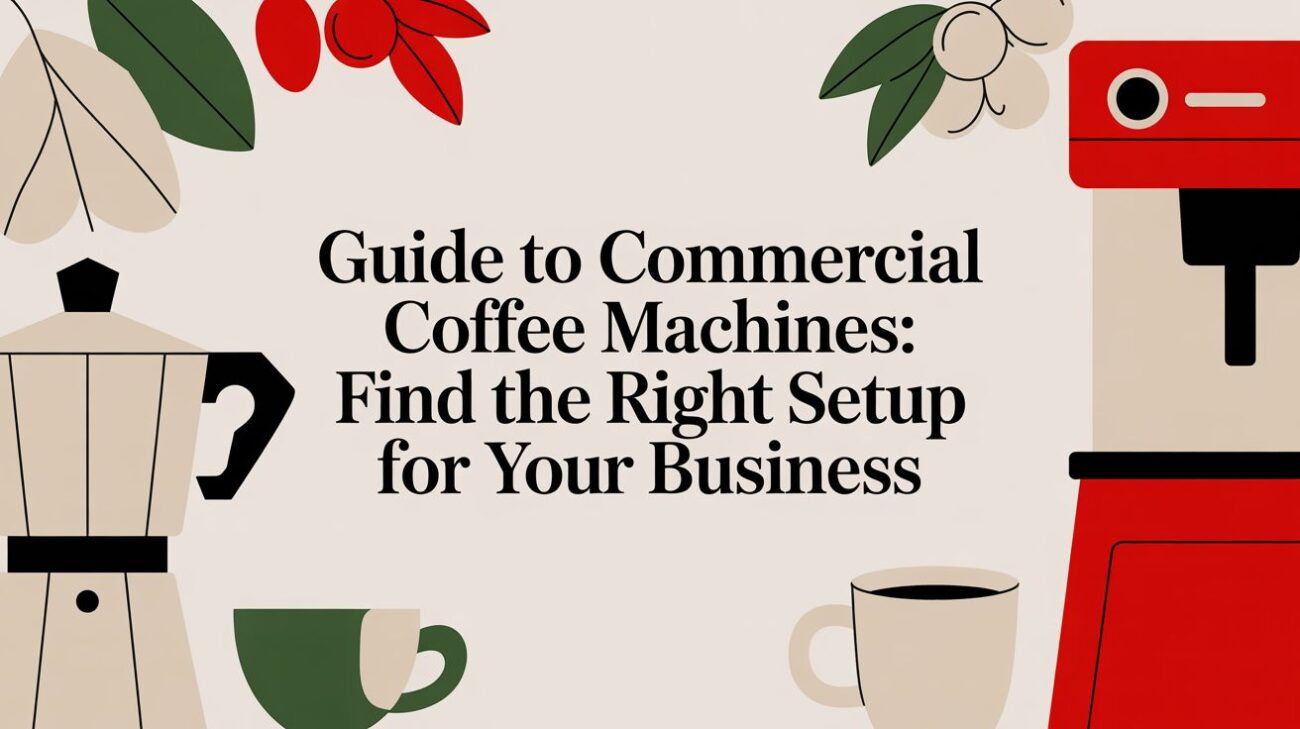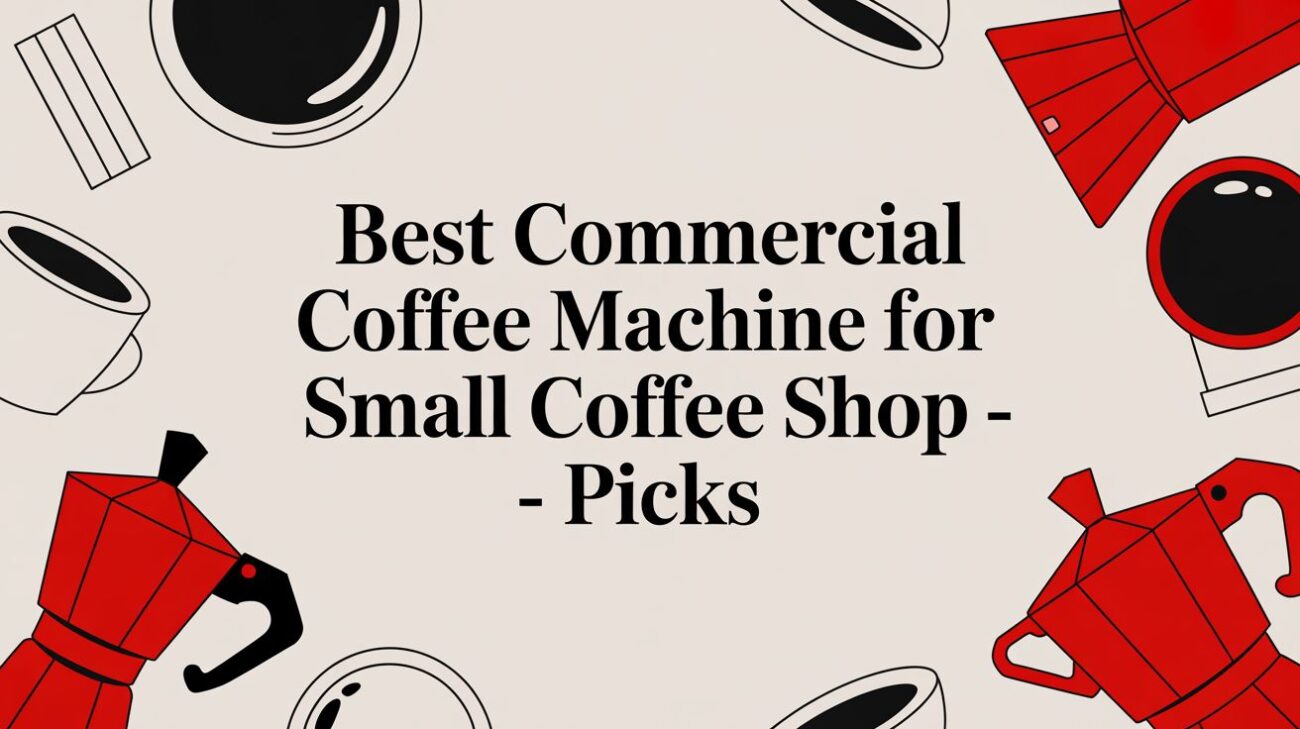Choosing a commercial coffee machine is one of the most significant decisions you’ll make for your business. Think of it as the heart of your operation—it directly influences customer happiness, staff workflow, and your bottom line. This guide is designed to help you cut through the jargon and find the perfect machine for your needs.
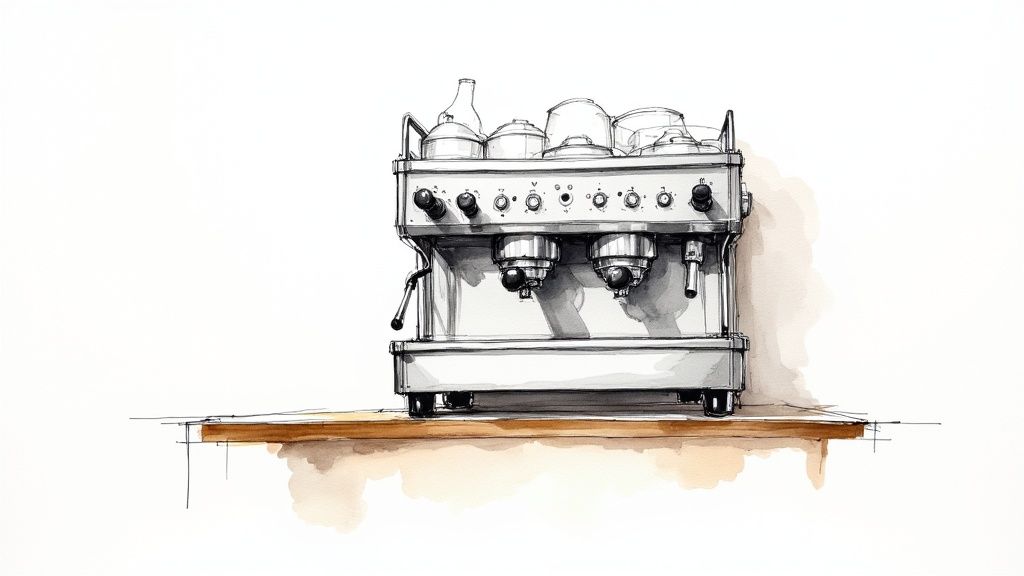
Why Your Choice of Coffee Machine Matters
Whether you’re running a bustling high-street café, a cosy village pub, or a sleek corporate office, the right coffee machine does more than just brew drinks. It’s a statement about your commitment to quality.
It promises consistency in every single cup and acts as a dependable workhorse, day in and day out. Get this choice wrong, and you’re looking at service bottlenecks, frustrated staff, and coffee that just doesn’t hit the mark.
This isn’t just about brewing coffee; it’s about understanding the unique rhythm and pulse of your business. And the demand for truly great coffee has never been higher. The UK’s commercial coffee machine market hit around £213 million in 2022 and is forecast to soar past £337 million by 2030, all thanks to our ever-growing love for a proper brew.
Matching the Machine to Your Mission
Before you start looking at gleaming new models, take a moment to define what you’re trying to achieve. Gaining clarity on what you actually need is the first, most crucial step towards making a smart investment.
Start by asking yourself a few honest questions:
- Who are you serving? The machine a speciality coffee shop needs to impress discerning customers is worlds away from what a high-volume canteen or a self-service office kitchen requires.
- What’s your team’s skill level? Do you have trained baristas ready to dial in the perfect espresso, or do you need a simple, push-button solution that anyone on the team can use with minimal training?
- What does your budget really look like? It’s not just the upfront cost. You need to account for installation, ongoing maintenance, and how you’ll finance it. A great place to start is exploring our coffee machine lease and rental options to understand the financial pathways available.
Answering these will immediately help you narrow down the huge range of commercial coffee machines out there. If your focus is purely on a workplace setting, it’s also worth checking out dedicated guides on the best coffee machines for offices for more tailored advice.
Decoding the Main Types of Coffee Machines
Diving into the world of commercial coffee machines can feel a bit overwhelming, but it gets much simpler when you realise they mostly fall into a few key categories. Understanding the core strengths of each type—and where they truly shine—is the first step to making a smart investment. Think of each machine as a specific tool for a specific job, whether that’s crafting a perfect artisan espresso or serving hundreds of people in a hurry.
The real differences come down to how they brew, the level of human skill required, and the volume of coffee they can produce. It’s a bit like choosing a vehicle; you wouldn’t take a Formula 1 car on a delivery round, and you wouldn’t expect a lorry to win a sprint race. The same logic applies here.
This quick diagram breaks down the main machine families by their brewing method and key attributes like pressure, capacity, and size.
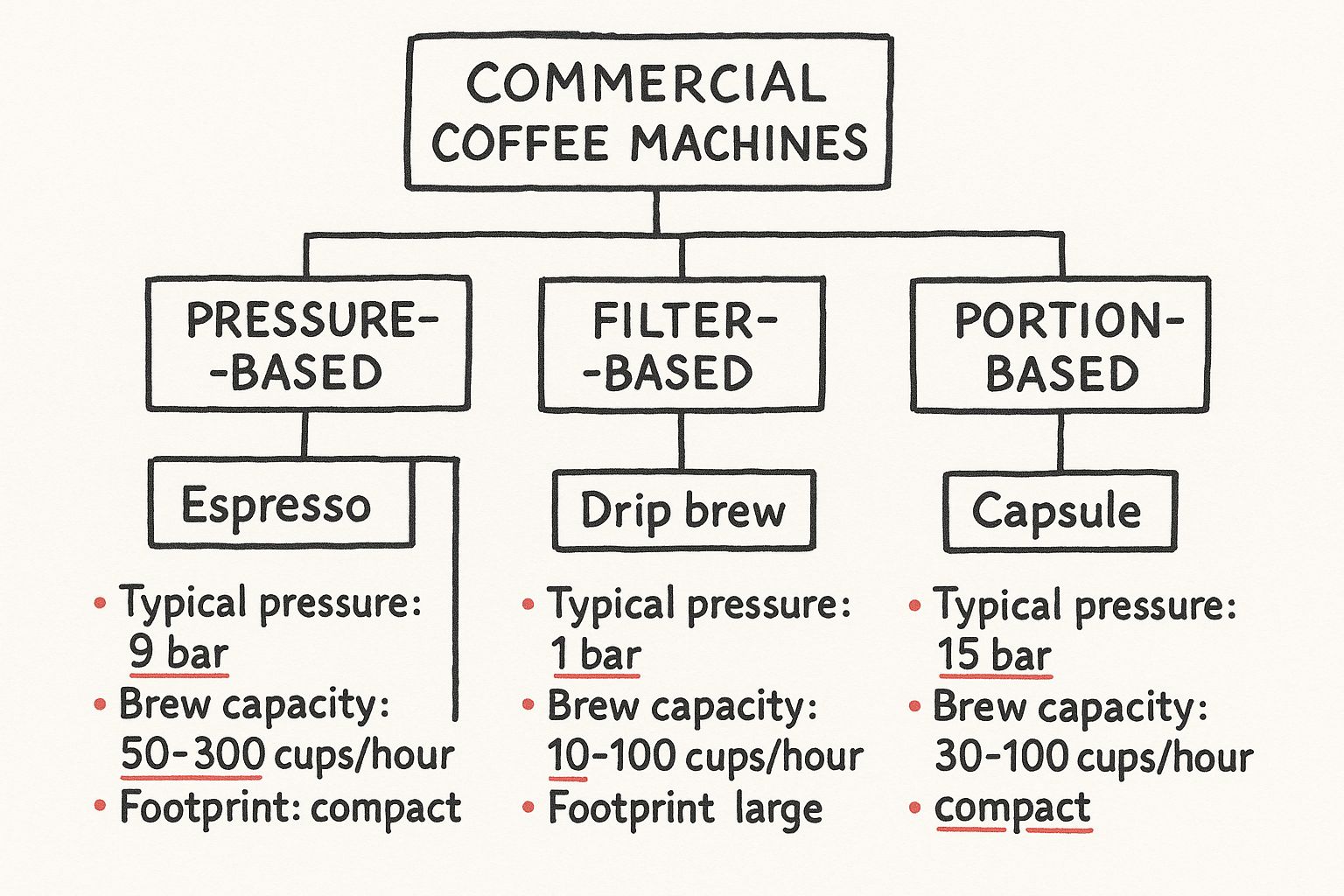
As you can see, the choice often boils down to balancing manual control against automation and sheer volume.
Traditional Espresso Machines The Artisan’s Choice
Picture a bustling café, the sound of steamed milk, a skilled barista pulling a perfect shot—you’re picturing a traditional espresso machine. These are the manual sports cars of the coffee world. They give the barista total control over every single variable, from the coarseness of the grind to the exact timing of the shot. A brilliant example is the La Spaziale S2, a true workhorse known for its reliability and quality.
They are built for performance and a bit of theatre, using high pressure (typically 9 bars) to force hot water through a tightly packed puck of fine coffee grounds. This is what creates that rich, complex, and aromatic espresso that’s the heart of every latte, cappuccino, and flat white. For any business where the quality of the coffee is the main event, such as a Conti Monte Carlo or La Cimbali M26, these machines are simply non-negotiable.
A traditional machine empowers a barista to create a truly bespoke coffee experience. It’s not just a beverage; it’s a craft, and this is the ultimate tool for that craft.
Of course, all that control demands a skilled operator. A trained barista is essential to get the very best out of one. If your dream is to serve top-tier, handcrafted coffee, then this is the machine for you.
Bean-to-Cup Machines Consistency at the Touch of a Button
Next up are bean-to-cup machines. These are the high-tech, automated workhorses of the industry, designed from the ground up for speed, simplicity, and rock-solid consistency. With just the press of a button, they do it all: grinding fresh beans, frothing the milk, and pouring a perfect drink every time.
Their biggest advantage is that you don’t need a specialist barista to run them. This makes them an ideal fit for places where staff are juggling multiple jobs, or where service needs to be fast and completely foolproof.
They’re the perfect solution for environments like:
- Busy Offices: Giving employees great coffee without any fuss.
- Hotel Breakfast Buffets: Letting guests help themselves to a fresh cappuccino.
- Convenience Stores: Offering a reliable, quality coffee for customers on the move.
While they don’t offer the same fine-tuned control as a traditional machine, modern bean-to-cup models produce fantastic, consistent coffee. It’s no wonder that choosing between the two styles is a common crossroads for businesses. If you’re weighing up your options, our detailed guide on bean-to-cup vs. traditional espresso machines can help you decide which path is right for your needs.
Bulk Brew and Filter Machines The Volume Kings
Finally, we have bulk brew and filter coffee machines. These are the unsung heroes of high-volume catering. They are designed to do one thing exceptionally well: make huge quantities of quality coffee quickly and keep it at the perfect serving temperature.
Unlike espresso machines, they use a drip-brew method, which is perfect for producing litres of black coffee in one go. You’ll find them as the backbone of conference centres, large canteens, and event venues where demand can suddenly spike. They make sure no one has to wait long for a fresh cup, keeping large groups of people happy and caffeinated.
Essential Features That Impact Your Daily Service
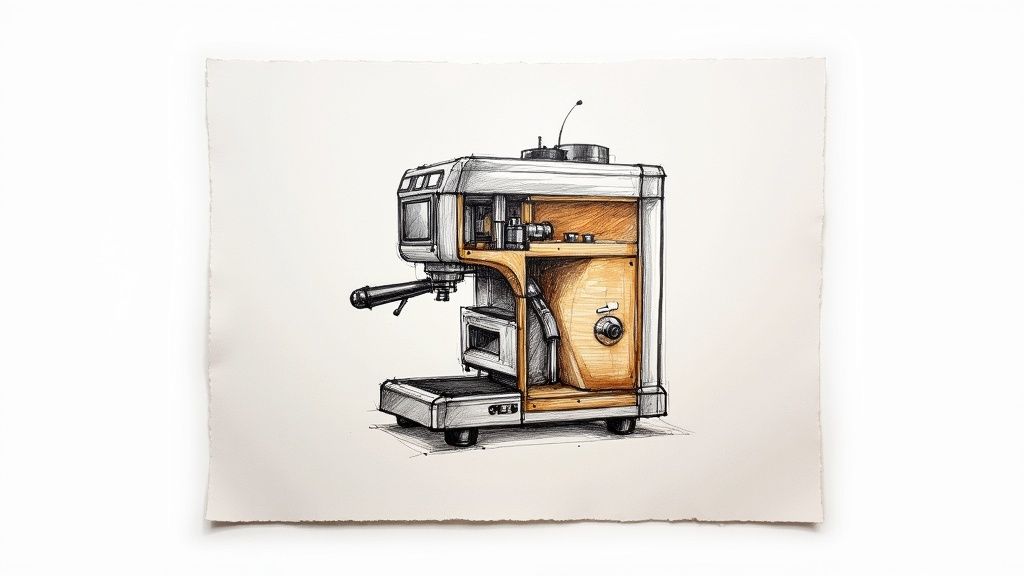
Once you’ve settled on the type of commercial coffee machine that fits your business, the real work begins: digging into the features. These aren’t just bullet points on a spec sheet. They’re the cogs that turn your daily service, directly impacting your speed, consistency, and ultimately, your bottom line.
Think of these features as your buyer’s checklist. Get them right, and your team will fly through the busiest morning rush, confident the machine can keep up. Get them wrong, and you’re signing up for frustrating bottlenecks, inconsistent drinks, and lost revenue.
Boiler Size and Power: The Engine of Your Operation
At the very heart of any traditional espresso machine lies its boiler. This is the engine room, responsible for delivering a constant supply of hot water for brewing and powerful steam for frothing milk. Its size and power are absolutely critical.
A small boiler might get by in a quiet village pub, but it will quickly run out of puff during a busy morning service. This causes a drop in pressure, leading to weak, underwhelming espresso shots and an inability to texture milk properly. It brings your entire workflow to a screeching halt.
Choosing a machine with an appropriately sized, powerful boiler is the single most important decision for ensuring you can handle peak demand without compromising on quality or speed.
Look for a machine with a boiler capacity that matches your projected busiest hour. A dual boiler system, which has separate boilers for brewing and steaming, offers even better stability, letting you pull shots and steam milk at the same time without any drop in performance.
Group Heads and Steam Wands: Your Points of Production
The number of group heads on an espresso machine dictates how many coffees you can physically make at once. Each group head is a workstation for a barista; more heads mean a higher potential output.
- One Group Head: Best suited for very low-volume sites, restaurants where coffee is an add-on, or as a secondary machine just for decaf.
- Two Group Heads: The industry standard for most small to medium-sized cafés. It offers a great balance between output potential and countertop footprint. Many of the most reliable traditional espresso machines fall into this category.
- Three or Four Group Heads: Reserved for extremely high-volume spots like busy city-centre coffee shops or event venues where speed is everything.
Just as important is the quality of the steam wands. High-performance, cool-touch wands make it far easier and safer for your baristas to create that perfect, silky microfoam for lattes and cappuccinos.
Smart Controls and Energy Efficiency
Modern commercial coffee machines are packed with clever features designed to improve consistency and bring down your running costs. Programmable volumetric controls, for instance, let you set the precise amount of water for single and double shots. This guarantees every single espresso is pulled to the same recipe, delivering consistency for your customers and simplifying the workflow for your staff.
Energy-saving modes are another vital feature, especially with utility costs always on the rise. These allow the machine to drop into a low-power state during quiet periods, significantly cutting down on electricity use without a long warm-up time when the next rush hits. It’s a smart bit of tech that reflects a wider trend, as the evolving European commercial coffee machine market continues to grow thanks to these kinds of advancements.
Matching Your Machine to Your Business Needs
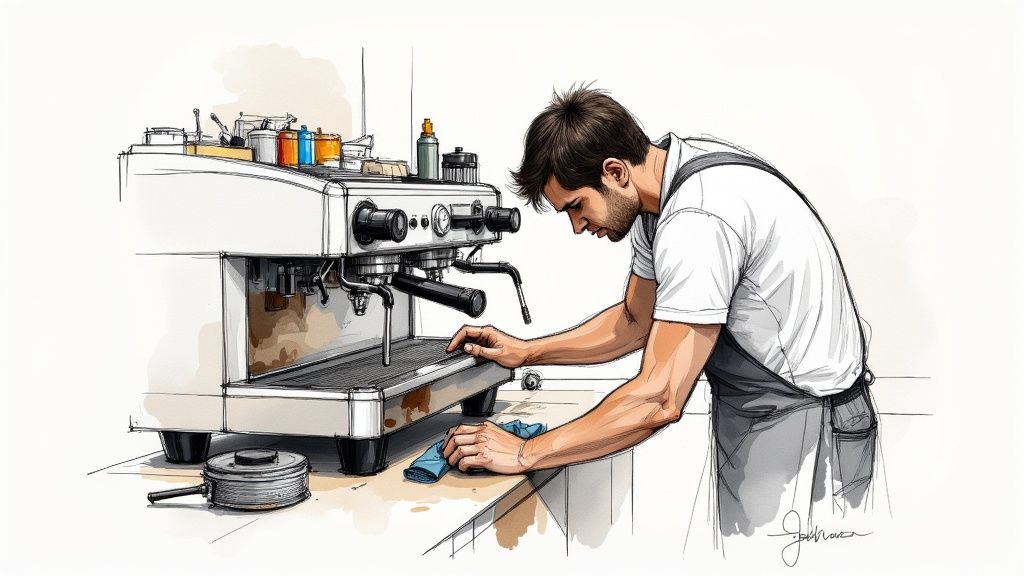
Putting a commercial coffee machine on your counter is a serious investment. To get it right, you need to step back from the shiny features and take a good, hard look at the practical, day-to-day realities of your business. This is about matching the machine to the unique rhythm of your operation, ensuring it becomes an asset, not a bottleneck.
The whole process kicks off with one crucial calculation: volume. Honestly, how many cups of coffee will you need to serve during your single busiest hour? Get this number right, and it will guide you to the perfect size and power, stopping you from either buying a machine that can’t keep up or splashing out on capacity you’ll never touch.
Calculating Your Peak Demand
Don’t just guess here. If you’re already trading, track your sales meticulously over a few weeks, focusing on those peak morning or lunchtime rushes. For a new venture, you’ll need to do your homework—research local footfall and build a conservative estimate based on your business plan.
A small suburban café might only need to handle 40-50 coffees an hour. In contrast, a frantic city-centre spot could easily need a machine that can churn out over 200 without breaking a sweat. Remember, this isn’t about average sales; it’s about surviving the rush. A machine that chokes during peak periods means long queues, stressed staff, and customers walking away.
Assessing Your Team’s Skill Level
Next up, who is actually going to be using the machine? The answer to this question will dramatically narrow down your options.
Are you hiring a team of passionate, skilled baristas who live and breathe coffee? People who can dial in a grinder with their eyes closed and pour perfect latte art every time? If so, a high-end traditional espresso machine is exactly what you need. It gives them the control to produce something truly special.
But if your staff are juggling a dozen other tasks in a busy pub, hotel, or office, a fully automatic bean-to-cup machine is a much smarter move. It delivers consistency and speed without needing weeks of training, meaning anyone on shift can serve a great coffee at the press of a button.
Choosing a machine that matches your team’s skills is non-negotiable. A complex traditional model is a waste of money without a trained barista, while a simple automatic machine could stifle the creativity in a speciality coffee shop.
Planning for Space and Utilities
Finally, let’s talk logistics—the boring but essential stuff. Commercial coffee machines are big, heavy, and have very specific needs.
- Counter Space: Get the tape measure out. You need enough room for the machine itself, plus a grinder, a knock box for used coffee grounds, and a decent working area.
- Power: Does it need a special high-amperage circuit? Check the tech specs and have a chat with an electrician before you buy.
- Plumbing: Most commercial machines need plumbing directly into the mains water supply, along with a waste pipe for drainage.
- Water Filtration: In the UK, a commercial water filter isn’t a nice-to-have; it’s absolutely vital. Limescale build-up is the number one cause of breakdowns and, just as importantly, it makes your coffee taste awful.
Sorting these practical details out now will save you from some serious headaches on installation day.
Protecting Your Investment with Proper Care
A top-tier commercial coffee machine isn’t just another piece of kitchen kit; it’s a long-term asset and the very heart of your daily coffee service. Keeping it running smoothly and pulling consistently great shots all comes down to proactive care. Cutting corners on maintenance is a false economy that almost always ends in costly breakdowns and frustrating downtime.
Protecting this asset starts before you even pull your first shot: professional installation. This guarantees all your electrical and plumbing connections are safe and up to spec, heading off problems from day one. Just as vital is fitting a high-quality water filtration system. This is your single best defence against limescale—the number one cause of machine failure in the UK.
The Power of Daily Routines
Consistent daily cleaning is completely non-negotiable, both for the quality of your drinks and the health of your machine. A simple checklist at the end of every service prevents the build-up of old coffee oils and milk residue, which can quickly taint flavour and clog up essential components.
Your daily shutdown procedure should always include these three steps:
- Backflushing the group heads: Using a blind filter basket and a specialised cleaning detergent, this process purges stale coffee grounds and oils from the shower screen and internal pathways.
- Cleaning steam wands: Wands need a wipe-down immediately after every single use, but a proper soak and purge at the end of the day is vital to stop milk hardening inside the tips.
- Washing portafilters and baskets: Soaking these in a food-safe solution gets rid of built-up residue, ensuring a clean slate for the next day’s service.
Why Professional Servicing is Essential
While daily cleaning is the groundwork, regular professional servicing is what truly extends the life of your machine. Think of it not as an expense, but as a necessary investment in your business.
A trained technician can spot wear and tear on internal parts like gaskets and seals long before they fail catastrophically. They’ll also calibrate pressure and temperature, making sure the machine is operating at peak efficiency. This preventative approach is your best strategy for avoiding a complete machine failure during a busy Saturday morning rush.
This commitment to quality is mirrored across the industry. The UK plays a huge role in the growing European commercial coffee machine market, thanks to our deep-rooted coffee culture and ever-rising demand for speciality drinks. Businesses are investing heavily in professional-grade equipment to meet this demand, which makes proper maintenance more critical than ever. You can learn more about how this trend is shaping the market on GlobeNewswire.
Common Questions About Commercial Coffee Machines
Choosing the right commercial coffee machine means weighing up a lot of information. To clear up any final questions, we’ve put together the answers business owners ask us most. Think of this as the last checklist before you make your choice with total confidence.
Domestic vs Commercial: What Is the Real Difference?
It’s a question every new café owner asks: “Can’t I just get away with a high-end domestic machine?” The answer is a firm no, and it all comes down to durability, capacity, and power.
Commercial machines are built for the front lines of a busy coffee shop. They use industrial-grade, heavy-duty parts designed to handle non-stop use, day in, day out. You also get much bigger boilers for a constant supply of steam and hot water, plus more powerful heating elements that recover in seconds between drinks.
A domestic machine, even a really good one, would simply burn out under the pressure of a commercial environment. The result? Slow service, frustrated customers, and constant breakdowns.
How Often Should My Machine Be Serviced?
Regular professional servicing isn’t just a recommendation; it’s essential for protecting your biggest investment. As a rule of thumb, we recommend a full professional service at least once a year. For busy sites pulling hundreds of coffees a day, stepping that up to every six months is a very smart move.
Think of it like preventative medicine for your machine. A qualified engineer will replace worn parts like seals and group head gaskets, descale the internal pipework, and recalibrate the pressure and temperature. This not only keeps your machine running safely but helps you dodge the cost and chaos of an emergency breakdown during the morning rush. If you do run into trouble, it helps to know what to look for; you can learn more by reading about 10 common coffee machine problems and how to fix them.
“A regular service plan is the single best insurance policy for your coffee machine. It prevents costly downtime and ensures every cup of coffee you serve is as good as the last.”
Is a Water Filter Really Necessary?
Yes. 100% essential. This is particularly true in the UK, where water hardness varies hugely from one area to another. Limescale build-up from hard water is the number one killer of coffee machines.
A proper commercial water filter does two vital jobs:
- It protects your machine. It stops damaging scale from clogging up heating elements, pipes, and valves.
- It makes your coffee taste better. A shot of espresso is over 98% water, so the quality of that water has a massive impact on the flavour in the cup. Bad water equals bad coffee.
Should I Lease a Machine Instead of Buying?
Leasing is an incredibly popular and sensible route, especially for new businesses trying to manage their cash flow. It gives you access to a top-tier machine without having to find thousands of pounds for an upfront payment, spreading the cost over a fixed, manageable term instead.
Better still, many lease packages bundle in the cost of installation, staff training, and ongoing servicing. This gives you a completely hassle-free, all-in-one way to manage your equipment and your finances, so you can focus on what matters: serving amazing coffee.
At ADS Coffee Supplies, we’re passionate about helping businesses like yours thrive. From beautiful, artisan-quality traditional espresso machines to all the beans, sundries, and support you could ever need, we have everything to get your coffee service running perfectly.
Explore our full range of traditional espresso machines and find the perfect heart for your operation today.

